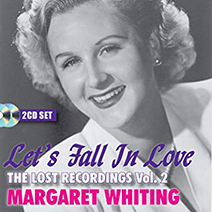Margaret Whiting
Let’s Fall in Love: Margaret Whiting- The Lost Recordings Volume 2
(My Ideal Music Inc. & Sepia Records)
December 3, 2019
Reviewed by Alix Cohen

At the behest of her father, Margaret Eleanor Whiting (1924 -2011) sang for Johnny Mercer when she was seven years old. Richard Whiting (“Hooray for Hollywood,” “Ain’t We Got Fun,” “Till We Meet Again”) knew burgeoning talent when he heard it. A seven-decade career as torch-bearer of The American Songbook included radio, television, recording, and teaching.
This 2-disc set, second in an invaluable series, consists of 56 previously unreleased Margaret Whiting recordings chosen from The Barry Wood Show—“15 minutes of the smoothest music ever.” Thirty were never recorded for commercial release. Wood, a popular baritone, host, and later producer, was Frank Sinatra’s predecessor as lead male vocalist on Your Hit Parade. Vinyl transcription discs were digitized and remastered for this issue.
On the first CD, we hear Whiting during her identified prime. Unless you lived through the period (or happen to be Will Friedwald or Vince Giordano), much of the material will be new. Songs arrive palpably warm. Lilting renditions of “Take Me,” “There’s a Lull in My Life,” and “I’m Gonna Love That Guy”—“like he’s never been loved before”—with a girl-group back-up, conjure cinematic black-and-white nightclub scenes. “If You Were the Only Boy” is romantic, pristine. The word “more” in “I Dream of You” arcs like a bird sailing a light breeze. The foxtrot piano encourages a graceful twirl and dip.
Eschewing brass, “Johnny One Note” smoothly swings. Long notes arrive without the need to prove prowess. In keeping with Wood’s studio style, the mid tempo version is a long way from jitterbug. Likewise, “Was That the Human Thing To Do?” shows no sign of accusatory sass. “I Got a Right to Sing the Blues” is molasses mournful.
Songs are elaborately and similarly orchestrated with lots and lots of strings—lyrical, dancy, mellow. We hear an organ on the plaintive “I’m Nobody’s Baby,” elsewhere a harp. Low-key, creamy vocals give every word and sentiment the same discerning attention. Margaret Whiting’s beautiful voice and stellar clarity wash over, creating respite.
The second CD is just as plummy, if a bit vocally brighter. Arrangements continue to be notably vintage. “Sentimental Journey— oh, the strings!—is easeeee. “Can’t Help Lovin’ Dat Man” and “Come Rain or Come Shine” hold even vocal keel, tender, unstressed.
“I’ve Told Ev’ry Little Star,” replete with rarely heard verse, is a light, ingenuous ballad, not pop. “There Are Such Things” feels like a fur wrap. A winning “Where or When?” spotlights Whiting’s impeccable control. Vibrato is nuanced, faint. Lyrics again arc. “Alone” is sweeping chiffon, a violin hovering over lovers.
The collection is elegant, but also companionable.





